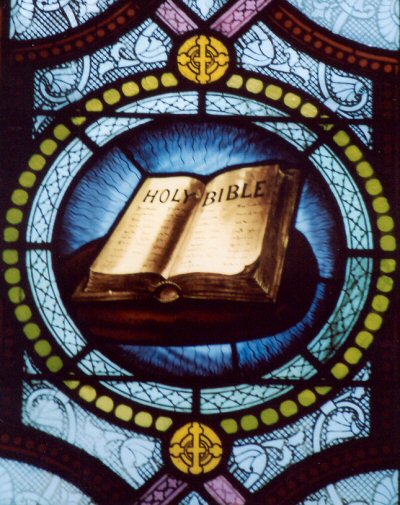 Liturgy of the Word
Liturgy of the WordSixteenth Sunday in Ordinary Time
July 19, 2020 Cycle A
Green priestly vestments symbolize hope and the vitality of
the life of faith.
Home Page
Liturgical Year Cycle
2019-2020
Introductory Acts Of Worship
The Entrance Prayers:
On Sunday, usually a hymn praising God
is sung in place of reciting a Psalm from the Bible which invites us to
enter more deeply into the mystery of God's love for us. The recited
weekday Psalm expresses a youthful heart and spirit, delighted that we may come
before the living God.
Entrance Song
/ Entrance Psalm (Antiphon)
Entrance Song Psalm: 54:6, 8
See, I have God for my help.
The Lord sustains my soul. I will sacrifice to you with willing heart, and
praise your name, O Lord, for it is good.
The Priest Approaches and Kisses the Altar: The altar is a symbol of Christ. In it are cut five crosses to recall the five wounds of Christ. The altar also represents the Church and has embedded in it the relics of her saints. The priest comes to the altar to celebrate the Sacrifice in the Church's name. Because of the glory surrounding the altar upon which the divine Sacrifice will be made, the kiss of the priest unites the Church to Christ, its Redeemer.
Priest:
In the name of the Father, and of the Son, and of the Holy Spirit.
All:
Amen.
The Greeting: We are welcomed in God's name. Our response unites us to our neighbor, to the priest and to God. (The priest may select from several forms of greeting).
Priest: The
grace of our Lord Jesus Christ and the love of God, and the communion of the
Holy Spirit be with you.
All:
And with your spirit.
The Penitential Prayers:
We recognize our guilt for past sins,
express our sorrow for them, and ask that Mary, the angels, the saints, and our
brothers and sisters in Christ pray for the Lord God's mercy. (The priest
may select from several forms).
Priest: Brothers and sisters, let us
acknowledge our sins, and so prepare ourselves to celebrate the sacred
mysteries.
Priest: You were sent to heal the contrite of heart: Lord, have
mercy.
All: Lord, have mercy.
Priest: You came to call sinners: Christ, have mercy.
All: Christ, have mercy.
Priest: You are seated at the right hand of the Father to intercede
for us: Lord, have mercy.
All: Lord, have mercy.
The Absolution:
Priest: May almighty God have
mercy on us, forgive us our sins, and bring us to everlasting life.
All:
Amen.
The Gloria: The Glory of God prayers have existed from the second century. They repeat the angels praise of God which heralded the birth of Christ on earth. Our praise is lifted again through the years as we rejoice at His coming as Lord, God, the most high Jesus Christ, who at Christmas took on our human nature while at the same time being the son of Man. This ancient hymn expresses our recognition of God's glory and love. It calls upon Christ as our holy and divine mediator, and the Holy Spirit who forever binds us together in God's love.
Priest and All: Glory to God in the highest, and on earth peace to people of good will. We praise you, we bless you, we adore you, we glorify you, we give you thanks for your great glory, Lord God, heavenly King, O God, almighty Father. Lord Jesus Christ, Only Begotten Son, Lord God, Lamb of God, Son of the Father, you take away the sins of the world, have mercy on us; you take away the sins of the world, receive our prayer; you are seated at the right hand of the Father, have mercy on us. For you alone are the Holy One, you alone are the Lord, you alone are the Most High, Jesus Christ, with the Holy Spirit, in the glory of God the Father. Amen.
The Collect: The priest lifts the united prayers and petitions of the congregation to God the Father through the merits of Jesus Christ in the Holy Spirit.
Priest: Show favor, O Lord, to your servants and mercifully increase the gifts of your grace, that, made fervent in hope, faith and charity, they may be ever watchful in keeping your commands. Through our Lord Jesus Christ, your Son, who lives and reigns with you in the unity of the Holy Spirit, one God, for ever and ever.
 Liturgy of the Word
Liturgy of the Word
Christ is made known to us through the Old Testament which prepares us to recognize Him. In those days, God inspired men who spoke His message. Now, the New Testament Gospel reading announces His presence to us directly through His Son. Both readings bring God's message to us. Our responsibility is to respond.
The First Reading:
From the Old Testament
Priest/Reader: A reading from the
Book of Wisdom.
Wisdom 12:13, 16-19
There is no god besides you who have the care of all, that you need show you have not unjustly condemned. For your might is the source of justice; your mastery over all things makes you lenient to all. For you show your might when the perfection of your power is disbelieved; and in those who know you, you rebuke temerity. But though you are master of might, you judge with clemency, and with much lenience you govern us; for power, whenever you will, attends you. And you taught your people, by these deeds, that those who are just must be kind; and you gave your children good ground for hope that you would permit repentance for their sins.
Priest/Reader:
The Word of the
Lord.
All:
Thanks
be to God.
The Responsorial Psalm:
This Psalm praising God, is a prayer to God,
or recommends the practice of virtue. It is sung as an interlude between
the scriptural readings. It provides yet another instructional setting and
invites the assembly to imitate the cantor who sings a repeated response to the
verses of an ancient Psalm many of which are attributed to King David. The
verses are sung first by a cantor (song leader) accompanied by instruments, the
refrain is sung by the people.
Psalm 86:5-6, 9-10,15-16
Cantor: Lord, you are good and forgiving.
All: Lord, you are good and forgiving.
Cantor: You, O Lord, are good and forgiving, abounding in kindness
to all who call upon you. Harken, O Lord, to my prayer and attend to the
sound of my pleading.
All: Lord, you are good and forgiving.
Cantor: All the nations you have made shall come and worship you, O
Lord, and glorify your name. For you are great, and you do wondrous deeds;
you alone are God.
All: Lord, you are good and forgiving.
Cantor: You, O Lord, are a God merciful and gracious, slow to
anger, abounding in kindness and fidelity. Turn toward me, and have pity
on me; give your strength to your servant.
All: Lord, you are good and forgiving.
The Second Reading: Taken from the New Testament, often from a letter written by St. Paul.
Priest/Reader: A Reading
from Paul to the Romans.
Second Reading: Romans 8:26-27
Brothers and sisters: The spirit comes to the aid of our weakness; for we do not know how to pray as we ought, but the Spirit himself intercedes with inexpressible groanings. And the one who searches hearts knows what is the intention of the Spirit, because he intercedes for the holy ones according to God's will.
The Alleluia: An ancient expression of joy anticipating the Lord's message we will hear in the Gospel.
Matthew 11:25
Cantor: Alleluia!
Alleluia! Alleluia!
All: R/. Alleluia! Alleluia! Alleluia!
Cantor: Blessed are you, Father, Lord of heaven and earth;
you have rvealed to little ones the mysteries of the kingdom.
All: R/. Alleluia! Alleluia! Alleluia!
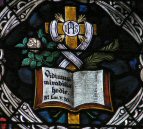 The Gospel:
The Liturgy of the Word is completed
by the reading of the Gospel. Before its reading, the members of the
assembly trace the sign of the cross upon the forehead to indicate their mental
acceptance of the Truth, on the lips to indicate their readiness to announce it,
and over the heart to indicate their sincere desire to accept it into their
lives. The "Good News" of the Gospel tells that God's kingdom has come for
all to hear, accept, and announce to the world for its salvation. It
is God who is speaking to us. Christ comes to teach us by the example of
His life and by His own words.
The Gospel:
The Liturgy of the Word is completed
by the reading of the Gospel. Before its reading, the members of the
assembly trace the sign of the cross upon the forehead to indicate their mental
acceptance of the Truth, on the lips to indicate their readiness to announce it,
and over the heart to indicate their sincere desire to accept it into their
lives. The "Good News" of the Gospel tells that God's kingdom has come for
all to hear, accept, and announce to the world for its salvation. It
is God who is speaking to us. Christ comes to teach us by the example of
His life and by His own words.
Priest: Cleanse my heart and my lips, almighty God, that I may worthily proclaim your
holy Gospel. Through the words of the Gospel may our sins be wiped away.
Priest: The Lord be with you.
All: And
with your spirit.
Priest/Deacon: A
reading from the holy Gospel according
to Matthew.
All: Glory
to you, Lord.
The Gospel: Matthew 13:24-43
Matthew wrote to show that Christ
was the
Messiah and fulfilled the Jewish prophecies.

He proposed another parable to them. "The kingdom of heaven may be likened to a man who sowed good seed in his field. While everyone was asleep his enemy came and sowed weeds all through the wheat, and then went off. When the crop grew and bore fruit, the weeds appeared as well. The slaves of the householder came to him and said, Master, did you not sow good seed in your field? Where have the weeds come from?' He answered, 'An enemy has done this.' His slaves said to him, 'Do you want us to go and pull them up?' He replied, 'No, if you pull up the weeds you might uproot the wheat along with them. Let them grow together until harvest; then at harvest time I will say to the harvesters, "first collect the weeds and tie them in bundles for burning; but gather the wheat into my barn."'"
He proposed another parable to them. "The kingdom of heaven is like a mustard seed that a person took and sowed in a field. It is the smallest of all the seeds, yet when full-grown it is the largest of plants. It becomes a large bush, and the 'birds of the sky come and dwell in its branches.'"
He spoke to them another parable. "The kingdom of heaven is like yeast that a woman took and mixed with three measures of wheat flour until the whole batch was leavened." All these things Jesus spoke to the crowds in parables. He spoke to them only in parables, to fulfill what had been said through the prophet: "I will open my mouth in parables, I will announce what has lain hidden from the foundation of the world."
Then, dismissing the crowds, he went into the house. His disciples approached him and said, "Explain to us the parable of the weeds in the field." He said in reply, "He who sows good seed is the Son of Man, the field is the world, the good seed the children of the kingdom. The weeds are the children of the evil one, and the enemy who sows them is the devil. The harvest is the end of the age, and the harvesters are angels. Just as weeds are collected and burned up with fire, so will it be at the end of the age. The Son of Man will send his angels, and they will collect out of his kingdom all who cause others to sin and all evildoers. They will throw them into the fiery furnace, where there will be wailing and grinding of teeth. Then the righteous will shine like the sun in the kingdom of their Father. Whoever has ears ought to hear."
Priest/Deacon: The Gospel of the Lord.
All: Praise
to you, Lord Jesus Christ.
The Priest's Sermon:
The priest develops, explains, and comments upon the Master's words,
so our minds may be
enlightened, and our
hearts enriched.
(A priestly reflection upon this Gospel)
Profession of Faith: We state in the Nicene Creed the principles of our faith in precise and definite terms.
All: I believe in one God, the Father, the Almighty, maker of heaven and earth, of all that is seen and unseen. I believe in one Lord, Jesus Christ, the Only Begotten Son of God, born of the Father before all ages. God from God, Light from Light, true God from true God, begotten, not made, consubstantial with the Father; through him all things were made. For us men and for our salvation he came down from heaven, and by the Holy Spirit was incarnate of the Virgin Mary, and became man. For our sake he was crucified under Pontius Pilate, he suffered death and was buried, and rose again on the third day in accordance with the Scriptures. He ascended into heaven and is seated at the right hand of the Father. He will come again in glory to judge the living and the dead and his kingdom will have no end. I believe in the Holy Spirit, the Lord, the giver of life, who proceeds from the Father and the Son, who with the Father and the Son is adored and glorified, who has spoken through the prophets. I believe in one, holy, catholic and apostolic Church. I confess one Baptism for the forgiveness of sins and I look for the resurrection of the dead and the life of the world to come. Amen.
General Intercessions: We pray for the needs of the pope, civic leaders, our own needs, those of others, the sick, the dying, those who have died, the church, and the world. The response of all to each intercession: Lord, hear our prayer.
All: Lord, hear our prayer.
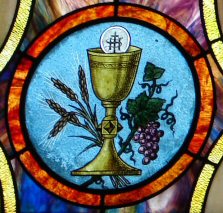 The Liturgy of the Eucharist
The Liturgy of the Eucharist
Gifts of bread and wine symbolizing ourselves are presented to the priest who will offer them to God the Father. Through the Holy Spirit, they will become the Body and Blood of Jesus Christ whom we receive in Holy Communion. Jesus unites Himself with us for our spiritual nourishment and strength. Today, when individuals do not present their own personal offerings of bread and wine, the monetary contribution symbolizes the material of their united sacrifice. The priest makes and offering of the bread and wine to God.
Preparation of the Bread and Wine:
Priest: Blessed are you, Lord God of all creation,
for through your goodness we have received the bread we offer you:
fruit of the earth and work of human hands, it will become for us the bread of
life.
All: Blessed be God for ever.
Priest: By the mystery of this water and wine may we come to share in the divinity of Christ, who humbled himself to share in our humanity.
Priest: Blessed are you, Lord God of all creation, for through your goodness we have
received the wine we offer you; fruit
of the vine and work of human hands it will become our spiritual drink.
All: Blessed be God for ever.
Priest: With humble spirit and contrite heart may we be accepted by you, O Lord, and may our sacrifice in your sight this day be pleasing to you, Lord God.
The Priest's Hands are Washed: This act was traditionally necessary because the priest handled the various gifts presented by the people. Now, the cleansing act using water reminds the priest and ourselves of the need to cleanse not only the hands but the soul. Soon, the priest's hands will hold the actual body of Christ, and we will become His dwelling place.
Priest: Wash me o Lord, from my iniquity and cleanse me from my sin. Pray, brethren, that my sacrifice and yours may be acceptable to God, the almighty Father.
All: May the Lord accept the sacrifice at your hands for the praise and glory of his name, for our good and the good of all his holy Church.
Prayer over the Gifts: Speaking in our name, the priest asks the Father to accept the gifts we offer through him.
Priest: O God, who in the one perfect sacrifice brought to completion varied offerings of the law, accept, we pray, this sacrifice from your faithful servants and make it holy, as you blessed the gifts of Abel, so that what each has offered to the honor of your majesty may benefit the salvation of all. Through Christ our Lord.
Eucharistic Prayer: (Number Two: The priest may select from several forms).
Priest: The Lord be with you.
All: And
with your spirit.
Priest: Lift up your hearts.
All: We lift them up to the Lord.
Priest: Let us give thanks to the Lord, our God.
All: It is right to
give him thanks and praise.
Preface Prayer:
Priest: It is truly right and just, our duty and our salvation,
always and everywhere to give you thanks, Lord, holy Father, almighty and
eternal God, through Christ our Lord. For by his birth he brought renewal
to humanity's fallen state, and by his suffering, canceled out ur sins; by his
rising from the dead he has opened the way to eternal life, and by ascending to
you, O Father, he has unlocked the gates of heaven. And so, with the
company of Angels and Saints, we sing the hymn of your praise, as without end we
acclaim:
Acclamation:
Priest
and All:
Holy, Holy, Holy Lord, God of power and might, Heaven and
earth are full of your glory. Hosanna in the
highest. Blessed
is he who comes
in the name of the Lord. Hosanna in the highest.
The priest repeats the words which
Christ used at his Last Supper when He changed the bread into His Body and the
wine into His Blood. His Body and Blood are truly present but under the
appearance of bread and wine. The death of Christ is prolonged in each of
those who receive Him worthily. We apply His death to ourselves so that we
may share His glory. This moment is the most solemn on earth because it is
Divine act which enables us to apply to ourselves the Cross which Christ
willingly took upon Himself.
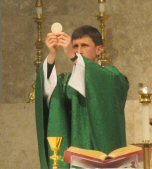 We are called to die to sin and
lift our very selves to God so that we become changed; to do as God would have
us do, to become what God would have us become. Our own little cross can
lift us into union with Christ's Cross so we may earn the joys of everlasting
happiness with God the Father.
We are called to die to sin and
lift our very selves to God so that we become changed; to do as God would have
us do, to become what God would have us become. Our own little cross can
lift us into union with Christ's Cross so we may earn the joys of everlasting
happiness with God the Father.
Priest: You are indeed Holy, O Lord, the fount of all holiness. Make holy, therefore, these gifts, we pray, by sending down your spirit upon them like the dewfall, so that they may become for us the Body and Blood of our Lord Jesus Christ. At the time he was betrayed and entered willingly into his Passion, he took bread and, giving thanks, broke it, and gave it to his disciples, saying:
Take this, all of you, and eat of it, for this is my Body, which will be given up for you.
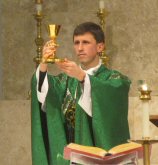 In a similar way, when supper was ended, he
took the chalice and, once more giving thanks, he gave it to his disciples,
saying:
In a similar way, when supper was ended, he
took the chalice and, once more giving thanks, he gave it to his disciples,
saying:
Take this, all of you, and drink from it, for this is the chalice of my Blood, the Blood of the new and eternal covenant, which will be poured out for you and for many for the forgiveness of sins. Do this in memory of me.
Memorial Acclamation: (The priest may
select from several forms).
Priest: The
mystery of faith.
Priest
/ All: We
proclaim your Death, O Lord, and profess your Resurrection until you come again.
Memorial Prayer: (The priest may select from several forms).
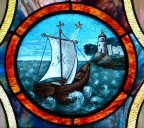 Priest:
Priest:
Recalls Christ's Passion, Resurrection, Ascension, the Church,
the dead, and ourselves.
Therefore, O Lord, as we celebrate the memorial of his Death and
Resurrection, we offer you, Lord, the Bread of life and the Chalice of
salvation, giving thanks that you have held us worthy to be in your presence and
minister to you. Humbly we pray that, partaking of the Body and Blood of
Christ, we may be gathered into one by the Holy Spirit.
Remember, your Church, spread throughout the world, and bring her to the fullness of charity, together with _____ our Pope, and _____ our Bishop, and all the clergy. Remember also our brothers and sisters who have fallen asleep in the hope of the resurrection, and all who have died in your mercy: welcome them into the light of your face.
Have mercy
on us all, we pray, that with the Blessed Virgin Mary, Mother of God, with
Blessed Joseph, her spouse, with the
blessed Apostles, and all the Saints who have pleased you throughout the ages,
we may merit to be coheirs to eternal life, and may praise and glorify you
through your Son, Jesus Christ.
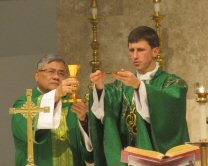 Doxology
Doxology
Prayer of Praise:
Through
him, with him, and in him, O God, almighty Father, in the unity of the Holy
Spirit, all glory and honor is yours, for ever and ever.
All: Amen.
Communion Rite
In the Liturgy of the Eucharist, we symbolically offer ourselves to the Lord through the gifts of bread and wine. At the Consecration, we offer our very lives to be united the God the Father through the Cross of Christ. In Communion, we find that we have not died at all, but have come to life. We have surrendered ourselves to God through His Divine Son, Jesus Christ. In return become ennobled and enriched. We give up time and we get eternity, we give up our sin and we receive grace, we surrender our self-will and receive the strength of the Divine Will, we give up ourselves and we receive everything. For the Son of God says to us that unless we receive Him we shall not have Divine life in us. But it is not really we who receive Christ as it is Christ who receives us, bringing us into Himself.
God makes His Cross the very means of our salvation and our life. While we have crucified Him, His eternal love cannot be extinguished. Christ willed to give us the very life we crucified in our Redemption, the Consecration of Holy Thursday into Communion, His death into our everlasting life.
The Lord's Prayer:
Priest: At
the Savior's command and formed by divine teaching, we dare to say:
Priest and
All: Our
Father, who art in heaven, hallowed be they name; Thy kingdom come; Thy will be
done on earth as it is in
heaven. Give us this
day our daily bread, and forgive us our trespasses, as we forgive those who
trespass against us; and lead us not into temptation, but deliver us from evil.
Priest: Deliver us, Lord, we pray, from every evil, graciously grant peace in our days, that, by the help of your mercy, we may be always free from sin and safe from all distress, as we await the blessed hope and the coming of our Savior, Jesus Christ.
All: For the kingdom, the power and the glory are yours now and forever.
Prayer for Peace:
Priest: Lord Jesus Christ, who said to your Apostles: Peace I leave
you, my peace I give you, look not on our sins, but on the faith of your Church,
and graciously grant her peace and unity in accordance with your will. Who
live and reign for ever and ever.
All: Amen.
Priest: The peace of the Lord be with
you always.
All: And with your spirit.
Priest: Let us offer each other the sign of peace.
Breaking of the Bread:
Priest: May this mingling of the Body and Blood of our Lord Jesus Christ bring eternal life to us who receive it.
Priest and All: Lamb of God, you take away the sins of the world,
have mercy on us.
Lamb of God, you take away the sins of the world, have mercy on us.
Lamb of God, you take away the sins of the world, grant us peace.
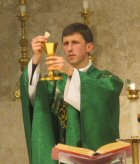 Priestly Preparation: Lord
Jesus Christ, Son of the living God, who, by the will of the Father and the work
of the Holy Spirit, through your Death gave life to the world, free me by this,
your most holy Body and Blood, from all my sins and from every evil; keep me
always faithful to your commandments, and never let me be parted from you.
Priestly Preparation: Lord
Jesus Christ, Son of the living God, who, by the will of the Father and the work
of the Holy Spirit, through your Death gave life to the world, free me by this,
your most holy Body and Blood, from all my sins and from every evil; keep me
always faithful to your commandments, and never let me be parted from you.
Priest: Behold
the Lamb of God, behold him who takes away the sins of the world. Blessed
are those called to the supper of the Lamb.
Priest and All: Lord, I am not worthy that you should enter under my roof, but only say the world and my soul shall be healed.
Priest: May the Body of Christ keep me safe for eternal life.
May
the Blood of Christ keep me safe for eternal life.
Communion Antiphon:
The Lord, the gracious, the merciful, has made a memorial of his wonders; he gives food to those who fear him.
Communion of the Faithful:
Priest:
The Body of Christ.
The Faithful: Amen.
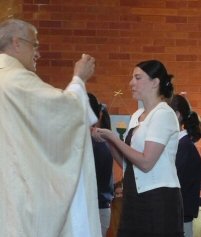
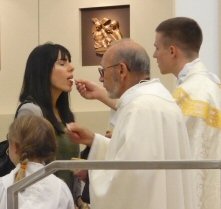
Priest/Deacon/
Extraordinary Eucharistic Minister:
The Blood of Christ.
The Faithful: Amen.
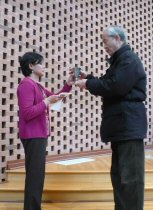
Cleansing of the Vessels:
Priest: What has passed our lips as food, O Lord, may we possess in purity of heart, that what has been given to us in time may be our healing for eternity.
Prayer after Communion:
Priest: Let us pray.
Priest: Graciously be present to your people, we pray, O Lord, and
lead those you have imbued with heavenly mysteries to pass from former ways to
newness of life. Through Christ our Lord.
Concluding Rite
Greeting:
Priest: The Lord be with you.
All: And
with your spirit.
Priest: Bow
down for the blessing.
Dismissal Prayer:
Priest: May the Lord bless and keep you.
All: Amen.
Priest: Purify your faithful, both in body and in mind, O
Lord, we pray, so that, feeling the compunction you inspire, they may be able to
avoid harmful pleasures and ever feed upon your delights. Through Christ
our Lord.
All: Amen.
Final Blessing:
Priest: And may the blessings of almighty God, the Father, and the Son,
and the Holy Spirit, come down on you and remain with you for ever.
All: Amen.
Dismissal:
Priest: Go forth, the Mass is ended.
All: Thanks be to God.
O my Jesus, forgive us our sins.
Save us from the fires of hell.
Lead all souls to heaven,
especially those in most need of your mercy.
www.Divinemasterplanforlife.com
www.Saintsnheaven.com
Home Page
Liturgical Year Cycle
2019-2020